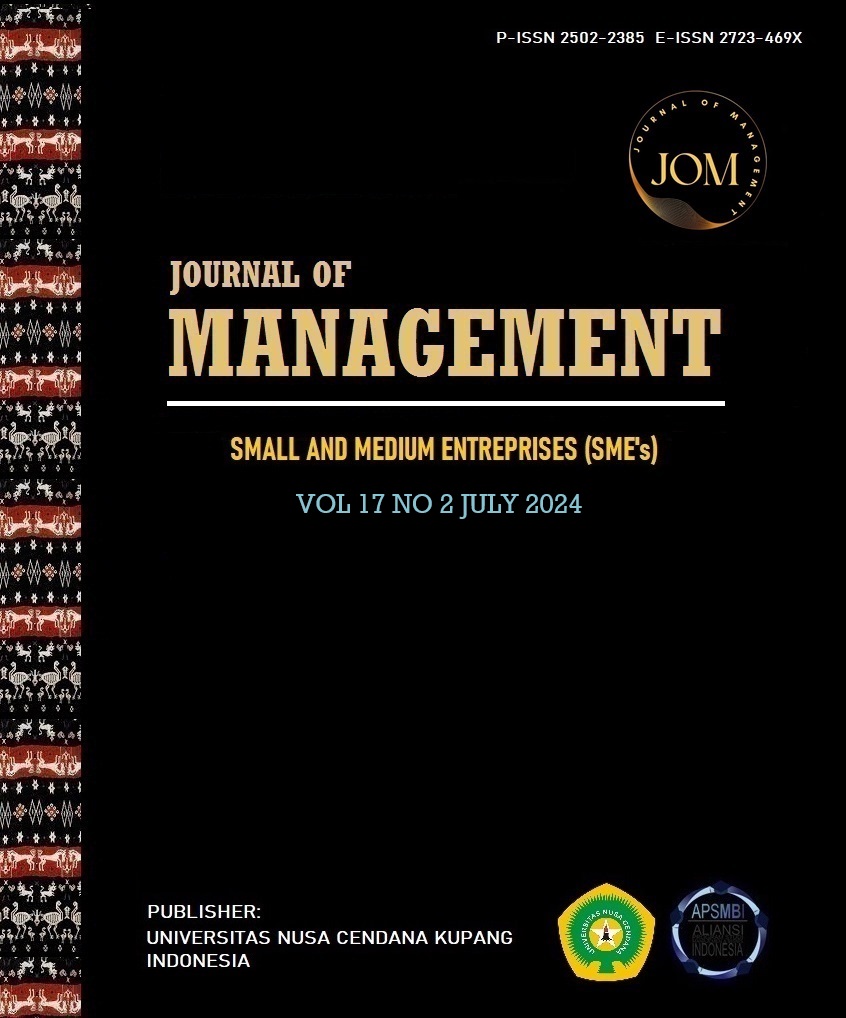PENGARUH KESADARAN DAN PENGETAHUAN TERKAIT KEAMANAN PRODUK TERHADAP NIAT PEMBELIAN PRODUK KECANTIKAN DAN PERAWATAN KULIT DI MASYARAKAT JABODETABEK
Abstract
The rise of the beauty and skincare industry in Indonesia is accompanied by a glaring issue of this industry: the existence of illegal products without certification National Agency of Drug and Food Control which possibly contain substances harmful to skin health. Even with the existence of said certification, it is evident that there are demands for such products. The question arises from such a phenomenon: are the Indonesian consumers of beauty and skincare products aware of the certification, and are they using said information in their purchase decision? This research is conducted to find the answers to those questions, by utilizing the theory of planned behavior expanded with awareness and knowledge variables. A study of 72 consumers in Jabodetabek shows that while they have both the awareness and knowledge about the safety of said products, their attitude towards uncertified products has more effect on their intention to purchase compared to other variables.
Keywords: Theory of Planned Behavior; Product Knowledge; Product Safety Awareness; Beauty and Skincare Products
Downloads
References
Ahmed, N., Li, C., Khan, A., Qalati, S. A., Naz, S., & Rana, F. (2021). Purchase intention toward organic food among young consumers using theory of planned behavior: role of environmental concerns and environmental awareness. Journal of Environmental Planning and Management, 64(5), 796–822.
https://doi.org/10.1080/09640568.2020.1785404
Ajzen, I. (1985). From intentions to actions: a theory of planned behavior. Action Control, 11–39.
Amoako, G. K., Dzogbenuku, R. K., & Abubakari, A. (2020). Do green knowledge and attitude influence the youth’s green purchasing? Theory of planned behavior. International Journal of Productivity and Performance Management, 69(8), 1609–1626. https://doi.org/10.1108/IJPPM-12-2019-0595
Anthony, A., Kembau, A. S., & Felix, A. (2024). Pengaruh Faktor E-Service Quality Dan Kepuasan Konsumen Terhadap Perilaku Konsumen Pada Produk Fashion Di E- Commerce Shopee. Syntax Literate ; Jurnal Ilmiah Indonesia.
https://doi.org/10.36418/syntax-literate.v7i11.15376
Asif, M., Xuhui, W., Nasiri, A., & Ayyub, S. (2018). Determinant factors influencing organic food purchase intention and the moderating role of awareness: A comparative analysis. Food Quality and Preference, 63(August 2017), 144–150. https://doi.org/10.1016/j.foodqual.2017.08.006
Azizah, K. N. (2022). Klarifikasi Madame Gie Usai 3 Produk Ditarik BPOM Gegara Bahan Berbahaya. DetikHealth. https://health.detik.com/berita-detikhealth/d-6352626/klarifikasi-madame-gie-usai-3-produk-ditarik-bpom-gegara-bahan-berbahaya
BPOM Indonesia. (2023). BPOM Temukan Lebih Dari 2 Juta Pieces Produk Mengandung Bahan Dilarang/Berbahaya. https://www.pom.go.id/berita/bpom-temukan-lebih-dari-2-juta-pieces-produk-mengandung-bahan-dilarang-berbahaya
BPOM Indonesia. (2024). Potret Pengawasan Kosmetik pada Klinik Kecantikan. https://www.pom.go.id/berita/potret-pengawasan-kosmetik-pada-klinik-kecantikan
Ghazali, E., Soon, P. C., Mutum, D. S., & Nguyen, B. (2017). Health and cosmetics: Investigating consumers’ values for buying organic personal care products. Journal of Retailing and Consumer Services, 39(August), 154–163. https://doi.org/10.1016/j.jretconser.2017.08.002
Handriana, T., Yulianti, P., Kurniawati, M., Arina, N. A., Aisyah, R. A., Ayu Aryani, M. G., & Wandira, R. K. (2020). Purchase behavior of millennial female generation on Halal cosmetic products. Journal of Islamic Marketing, 12(7), 1295–1315. https://doi.org/10.1108/JIMA-11-2019-0235
Hasibuan, L. (2022). Industri Kecantikan Tahan Krisis, Laris Manis Meski Pandemi. CNBC Indonesia. https://www.cnbcindonesia.com/lifestyle/20221104104902-33-385138/industri-kecantikan-tahan-krisis-laris-manis-meski-pandemi
Kementerian Koordinator Bidang Perekonomian. (2024). Hasilkan Produk Berdaya Saing Global, Industri Kosmetik Nasional Mampu Menembus Pasar Ekspor. https://www.ekon.go.id/publikasi/detail/5626/hasilkan-produk-berdaya-saing-global-industri-kosmetik-nasional-mampu-tembus-pasar-ekspor-dan-turut-mendukung-penguatan-blue-economy
Kim, J. J., & Hwang, J. (2020). Merging the norm activation model and the theory of planned behavior in the context of drone food delivery services: Does the level of product knowledge really matter? Journal of Hospitality and Tourism Management, 42(June 2019), 1–11. https://doi.org/10.1016/j.jhtm.2019.11.002
Mishra, P., Pandey, C. M., Singh, U., Gupta, A., Sahu, C., & Keshri, A. (2019). Descriptive statistics and normality tests for statistical data. Annals of Cardiac Anaesthesia. https://doi.org/10.4103/aca.ACA_157_18
Primasasti, A. (2022). Daftar Izin BPOM Mudah Secara Online Melalui e-BPOM. https://surakarta.go.id/?p=24226
Putra, I. G. W. S. C., Wijaya, R. W. N., & Noverin, D. T. (2022). Perbandingan Pengaruh Promotion Mix Terhadap Keputusan Penggunaan Digital Wallet Pada E-Marketplace Tokopedia Dan Shopee. Bisma: Jurnal Bisnis Dan Manajemen. https://doi.org/10.19184/bisma.v16i1.23972
Putri, D. L., & Pratiwi, I. E. (2023). BPOM Rinci 13 Produk Kosmetik Ilegal yang Masih Beredar di Pasaran, Terbukti Mengandung Merkuri. Kompas.Com. https://www.kompas.com/tren/read/2023/07/02/122900565/bpom-rinci-13-produk-kosmetik-ilegal-yang-masih-beredar-di-pasaran-terbukti
Rao, A. R., & Sieben, W. A. (1992). The Effect of Prior Knowledge on Price Acceptability and the Type of Information Examined. Journal of Consumer Research. https://doi.org/10.1086/209300
Roscoe, J. T. (1975). Fundamental Research Statistics for The Behavioural Sciences (2nd Edition). In Holt Rinehart & Winston, New York.
Sekaran, U., & Bougie, R. (2016). (2016). Research methods for business: A skill building approach. John Wiley & Sons.. In The Encyclopedia of Research Methods in Criminology and Criminal Justice: Volume II: Parts 5-8.
Shahid, S., Ahmed, F., & Hasan, U. (2018). A qualitative investigation into consumption of halal cosmetic products: the evidence from India. Journal of Islamic Marketing. https://doi.org/10.1108/JIMA-01-2017-0009
Sheppard, B. H., Hartwick, J., & Warshaw, P. R. (1988). The Theory of Reasoned Action: A Meta-Analysis of Past Research with Recommendations for Modifications and Future Research. Journal of Consumer Research. https://doi.org/10.1086/209170
Shimul, A. S., Cheah, I., & Khan, B. B. (2022). Investigating Female Shoppers’ Attitude and Purchase Intention toward Green Cosmetics in South Africa. Journal of Global Marketing, 35(1), 37–56. https://doi.org/10.1080/08911762.2021.1934770
Sugiyono. (2023). Metode Penelitian Kuantitatif, Kualitatif, dan R&D. Penerbit ALFABETA.
Tarigan, A., & Noverin, D. T. (2024). The Influence of Social Media Marketing and Brand Image on Intention to Purchase Residential Apartments. Jurnal Ilmiah Manajemen Dan Bisnis, 10(1), 81. https://doi.org/10.22441/jimb.v10i1.23017
Wang, X., Pacho, F., Liu, J., & Kajungiro, R. (2019). Factors influencing organic food purchase intention in Tanzania and Kenya and the moderating role of knowledge. Sustainability (Switzerland), 11(1). https://doi.org/10.3390/su11010209

 Ruth Nattassha(1*)
Ruth Nattassha(1*)



